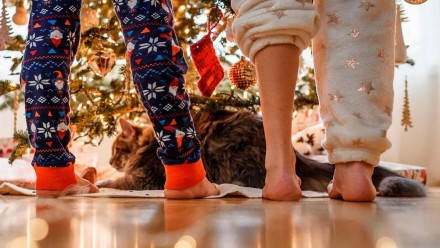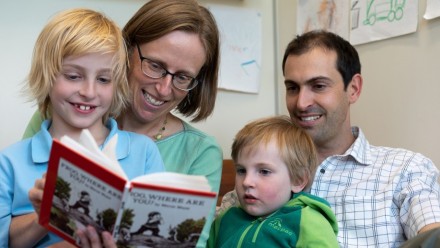Baby did a lab, lab thing: the families being studied for science
Written by Tabitha Carvan
What’s it like to be studied by researchers for your entire life – including in your own home?
In a specially-designed lab at ANU, a study participant is advised to sit as still as a statue while her eye movements are tracked by a camera.
“Can I sing you a song?” the participant asks, and she does, between mouthfuls of yoghurt squeezed out from a packet in her fist.
After she’s done, the participant is prompted to describe a series of animations displayed on the screen.
“The sheep is getting chased by the horse.
“The mouse is kissing the cat.”
The Research Officer cheers, and the participant is given some stickers as a reward.
“Don’t eat the stickers,” she’s told, after trying to eat the stickers.
This is the Language Lab at the ANU Research School of Psychology, home of the Canberra Longitudinal Child Language Project. Mice have been kissing cats here for almost five years now, as children have come to be studied, and occasionally to eat stickers.
Over 100 children have been participating in the study since they were nine months old, visiting the lab every three to six months. Researchers are collecting data on how the kids develop rapid language processing, both in the lab and through recordings made at their homes.
As part of the $28-million ARC Centre of Excellence for the Dynamics of Language at ANU, the project is looking to explain individual variability among children: why some two-year-olds have more than 200 words in their vocabulary while some have none.
“That aspect is novel,” lead researcher Associate Professor Evan Kidd says. “But the magnitude of the study is also what makes it novel. It’s rare that studies can follow this large number of kids for so long.”
The first cohort of participants are now reaching the age of five, and are ready to graduate from the lab, a place they might have visited more often than their grandparents’ house.
Bronwyn has been taking her son Alec, now four and a half, since he was a baby.
“He has only two visits to go and it will actually be weird when we’re not going anymore,” Bronwyn says. “He doesn’t know life without the Language Lab.”
While Bronwyn says she’s enjoyed the process and would agree to do it all again, there have been some challenges.
“The hardest bit was up until Alec was two, he had to wear this special pair of overalls with a recorder inside them to record all our interactions for 12-hour periods. That was okay when he was a baby because he couldn’t object but once he was closer to two, it was very difficult. He did not want to wear the overalls!”
These home recordings were painful for Bronwyn too, for a different reason.
“It was supposed to be a normal day, recording everything that Alec said and heard at home. But it felt excruciating! What inanities have I been wittering away? I tried not to be consciously changing my language but I still shudder to think what was on those recordings.
“Imagine someone listening back to 12 hours of your life… It doesn’t bear thinking about!”
Associate Professor Kidd laughs when he hears this, saying participants should be reassured that “we’re really not interested in what people are saying, and we’re definitely not judging the parents!”
These thousands of hours of recordings won’t actually be transcribed, but plugged into a computer program using natural language processing to give an estimate of the number of adult words in the environment, an index of the child’s vocalisations, and also of the conversational turns between the child and the adult.
“We’re only interested in the value of the numbers,” Associate Professor Kidd stresses.
He says it will take years before all the data is fully analysed. Its overall value, he says, is enormous.
“Language is super important. We know that children’s spoken language is one of the best predictors of scholastic achievement, literacy, and also of other social processes.”
Bronwyn says she’s been fascinated by the development of her children’s language, and that being part of the study has given her more of an opportunity to reflect on the processes involved.
“Young children’s minds are incredible. They effortlessly master things which seem impossible when you’re older. So it’s been nice to have this time of his life captured and recorded.”
“I do hope the participants have got something out of it,” Associate Professor Kidd adds, “because they are obviously completely essential to the project. I am so humbled by their commitment.”
As the first graduations approach, Associate Professor Kidd reflects that it’s been a “crazy experience” for the researchers to have “these little baby cherubs” grow up right before their eyes.
“Studying kids really does make you feel old! They’ll probably be 20 years old and we’ll still be here publishing their data.”
There's only one thing better than being in a psychology study - and that's studying psychology. Find out more about psychology degrees at ANU.








